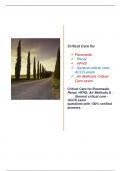Critical Care for
Paramedic
. Renal
. HFHS
. General critical care -
ACCS exam
. Air Methods Critical
Care exam
Critical Care for;Paramedic,
Renal, HFHS, Air Methods &
General critical care -
ACCS exam
questions with 100% verified
answers
,Critical Care for;Paramedic, Renal, HFHS, Air Methods & General critical care -ACCS exam
questions with 100% verified answers
Critical Care Paramedic Exam
Normal pH - correct answer 7.35-7.45
Normal CO2 - correct answer 35-45
Normal HCO3 - correct answer 22-26 (good dating age)
Normal PaO2 - correct answer 80-100
Normal SaO2 - correct answer > 95%
Base (deficit/excess) - correct answer (-2) - (+2)
Buffer systems: Bicarb reaction time - correct answer seconds
Buffer systems: Lungs reaction time - correct answer minutes
Buffer systems: Kidneys reaction time - correct answer hours to days
Minute volume calculation - correct answer Tidal volume x respiratory rate
pCO2 >45 - correct answer acidotic
pCO2 <35 - correct answer alkalotic
HCO3 <22 - correct answer acidotic
HCO3 >26 - correct answer alkalotic
base deficit of < -4 - correct answer indicator for the potential need for blood transfusion
base deficit of < -19 - correct answer indicates poor outcome (death likely)
base deficit replacement formula - correct answer 0.1 x (-BE) x patient weight in kg = bicarb
needed
PO2 of 60 is roughly equivalent to a SaO2 of - correct answer 90%
critical pH for intubation - correct answer < 7.2
critical pCO2 for intubation - correct answer > 55
critical pO2 for intubation - correct answer < 60
number one cause of metabolic acidosis - correct answer lactic acidosis (lactate > 4)
CO2 is a byproduct of - correct answer metabolism
,Critical Care for;Paramedic, Renal, HFHS, Air Methods & General critical care -ACCS exam
questions with 100% verified answers
for every __ change in ETCO2, you should expect the pH to change __ in the ___________
direction. - correct answer 10, 0.08, opposite
for every __ change in pH, you should expect the HCO3 to change __ in the ___________
direction. - correct answer 0.15, 10, same
for every __ change in pH, you should expect the potassium to change __ in the ___________
direction. - correct answer 0.10, 0.6, opposite
LEMON - correct answer difficult intubation
look, evaluate (3-3-2), mallampati, obstructions, neck mobility
HEAVEN - correct answer difficult intubation
Hypoxia, extremes of size, anatomic challenges, vomit/blood/fluid, exsanguination, neck
mobility issues
ramping - correct answer ear to sternal notch
without ramping during intubation or transport causes a potential for - correct answer
decrease in functional reserve capacity, tidal volume, and preload
Sellick's maneuver and BURP - correct answer no longer recommended
External laryngeal manipulation (ELM) - correct answer current standard of practice
bougie adult size - correct answer 15 Fr
bougie pediatric size - correct answer 10 Fr
bougie neonatal size - correct answer 6 Fr
supraglottic devices - correct answer provide little protection against aspiration
ETT cuff pressure - correct answer 20-30 mmHg (25 is standard)
gold standard of confirming ET placement - correct answer chest X-Ray
distal tip of ET - correct answer 2-3 cm (1 inch) above carina, at T3 or T4
7 p's for RSI success - correct answer preparation, preoxygenation, pretreatment, paralysis
with induction, protect/position, placement (with proof), post intubation management
LOAD - correct answer pretreatment for RSI
lidocaine, opiates, atropine (infants), defasiculating dose
fentanyl adult dose - correct answer 1 mcg/kg
fentanyl onset - correct answer 3-5 mins
, Critical Care for;Paramedic, Renal, HFHS, Air Methods & General critical care -ACCS exam
questions with 100% verified answers
fentanyl post intubation management - correct answer 0.5 - 1.5 mcg/kg every 5 minutes
fentanyl post intubation management infusion - correct answer 1-3 mcg/kg/hour
fentanyl reversal agent - correct answer narcan
etomidate adult dose - correct answer 0.3 mg/kg
etomidate onset time - correct answer 15-45 seconds
etomidate duration - correct answer 3-12 minutes
etomidate cautions/contraindications - correct answer hemodynamically unstable patients,
adrenal suppression, shock patients, COPD/asthmatic
ketamine adult dose - correct answer 1-2 mg/kg
ketamine onset - correct answer 40-60 seconds
ketamine duration - correct answer 10-20 minutes
ketamine is preferred for - correct answer asthmatic patients
ketamine post intubation management - correct answer 0.5 - 1 mg/kg
ketamine post intubation management infusion - correct answer 1-2 mg/kg/hour
versed adult dose - correct answer 2.5-5 mg
versed onset - correct answer 30-60 seconds
versed duration - correct answer 15-30 minute duration
versed post intubation management - correct answer 2-5 mg
versed post intubation management infusion - correct answer 0.05 - 0.1 mg/kg/hour
versed reversal agent - correct answer flumazenil (romazicon) 0.2 mg
propofol (diprivan) adult RSI dose - correct answer 1-2 mg/kg
propofol (diprivan) adult maintenance dose - correct answer 25-50 mcg/kg/min
propofol (diprivan) onset - correct answer 15-45 seconds
propofol (diprivan) duration - correct answer 5-10 minutes
propofol (diprivan) cautions - correct answer hemodynamically unstable patients
succinylcholine (anectine) - correct answer depolarizing neuromuscular blocker agent
succinylcholine (anectine) can cause - correct answer fasciculations




